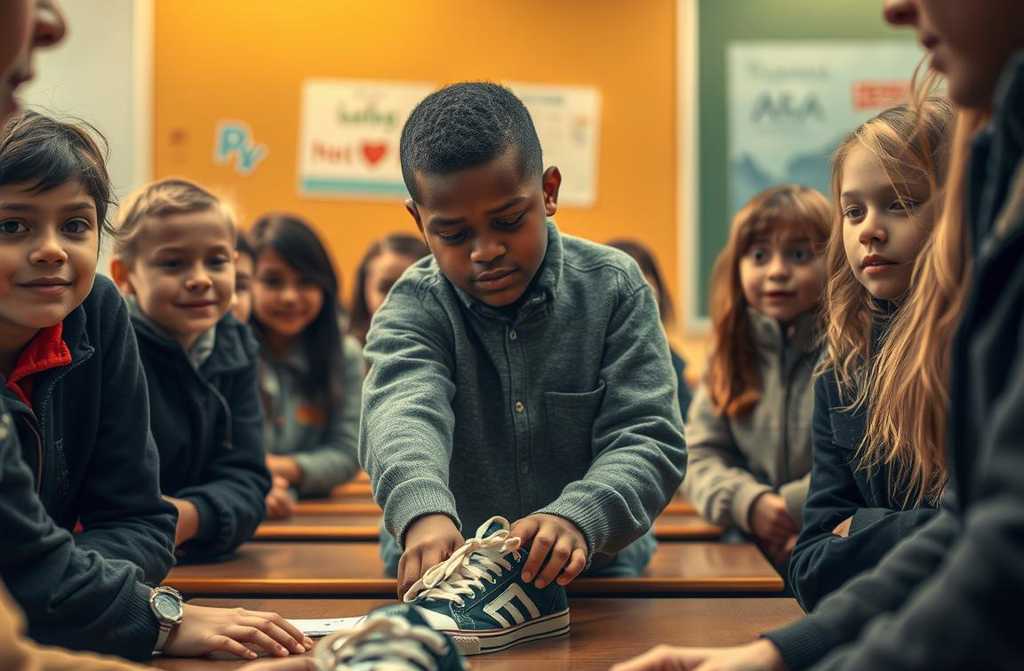З життя
Impoverished African-American Boy Endures Taunts for Worn-Out Sneakers — His Teacher’s Shocking Revelation Stuns the Entire Classroom

The morning bell hadnt yet chimed when Oliver Whitby slunk into St. Albans Secondary, shoulders hunched, praying no one would glance his way. But they always did.
Look at Whitbys wrecked trainers! someone crowed, and the room burst into giggles. His shoes were frayed at the edges, the right sole flapping like a loose tongue. Olivers cheeks burned, but he kept walking, eyes fixed on the scuffed linoleum. He knew better than to react.
It wasnt new. Olivers mum, Margaret, juggled two jobs just to keep the heating onwaitressing at a café by day, cleaning offices by night. His dad had vanished years ago. Every time Oliver outgrew his clothes, there was never enough to replace them. Shoes became a dream they couldnt afford.
But today stung worse. It was school photo day. His classmates strutted in designer jumpers, crisp polos, and spotless trainers. Oliver wore second-hand trousers, a threadbare jumper, and those shoes that betrayed the truth he hid: he was skint.
During PE, the taunts sharpened. As they lined up for football, a boy stomped on Olivers sole, splitting it wider. He stumbled, met with another wave of jeers.
Cant even afford proper boots, and he thinks he can play, one sneered.
Oliver clenched his fists, not at the insult, but at the memory of his little sister, Emily, at home with no proper winter coat. Every penny went to rent and food. He wanted to shout, *You dont know a thing!* But he swallowed the words.
At lunch, Oliver sat alone, nibbling his cheese sandwich while others wolfed down chips and burgers. He tugged his sleeves to hide the unravelling threads, curled his toes to hide the flapping sole.
At her desk, Miss Eleanor Davies watched him closely. Shed seen teasing before, but something about Oliverthe way his shoulders sagged, eyes dull, burdened beyond his yearsmade her chest tighten.
That afternoon, after the final bell, she asked softly, Oliver, how long have you had those trainers?
He stiffened, then murmured, Ages.
It wasnt much. But in his eyes, Miss Davies saw a story far bigger than a pair of shoes.
Miss Davies lay awake that night. Olivers quiet shame gnawed at her. She checked his records: grades steady, attendance near-perfectrare for kids in tough spots. The nurses notes stood out: frequent tiredness, threadbare uniform, skips free meals.
The next day, she asked Oliver to stay behind. At first, he bristled, suspicion in his gaze. But her tone held no pity.
Is everything alright at home? she asked gently.
Oliver bit his lip. Finally, he nodded. Mums always working. Dads gone. I look after Emily. Shes seven. Sometimes I make sure she eats first.
The words lodged in Miss Davies throat. A twelve-year-old boy with the weight of a parent.
That evening, with the school counsellor, she drove to Olivers estate. The flat was tidy but sparse: a flickering lamp, a worn sofa, a nearly empty fridge. Margaret greeted them, still in her waitress apron, exhaustion etched in her smile.
In the corner, Miss Davies spotted Olivers study spotjust a stool, a notebook, and above it, a university leaflet. One line was circled in biro: *Bursary Information.*
That was when Miss Davies understood. Oliver wasnt just poor. He was relentless.
The next day, she spoke to the headmaster. Quietly, they arranged help: free meals, uniform vouchers, a donation from a local charity for new shoes. But Miss Davies wanted more.
She wanted his classmates to see Olivernot as the boy with wrecked trainers, but as the boy carrying a story heavier than any of them knew.
On Monday, Miss Davies faced the class. New project, she announced. Each of you will share your real storynot the surface, but whats beneath.
There were groans. But when Olivers turn came, silence fell.
He stood, voice barely above a whisper. Some of you laugh at my shoes. Theyre old. But I wear them because my mum cant afford new ones. She works two jobs so me and Emily can eat.
The room froze.
I look after Emily after school. Help with her maths, make sure shes fed. Sometimes I skip meals, but its fine if shes alright. I study hard because I want a bursary. I want a proper job so Mum doesnt have to work herself to the bone. So Emily never has to wear shoes like mine.
No one moved. No one laughed. The boy whod mocked him stared at his desk, face flushed.
Finally, a girl murmured, Oliver I didnt know. Im sorry. Another muttered, Yeah. Me too.
That afternoon, the same lads whod taunted him called Oliver over for football. For the first time, they passed him the ball, cheering when he scored. A week later, a group pooled their pocket money and, with Miss Davies help, bought Oliver a new pair of trainers.
When they handed them over, Olivers eyes welled up. But Miss Davies reminded the class:
Strength isnt in what you wear. Its in what you carryand how you keep going, even when lifes unfair.
From then on, Oliver wasnt just the boy with wrecked trainers. He was the boy who taught his class about grit, heart, and the quiet battles no one sees.
And though his shoes had once made him a target, his story turned them into something elseproof that true strength cant be worn down.

















